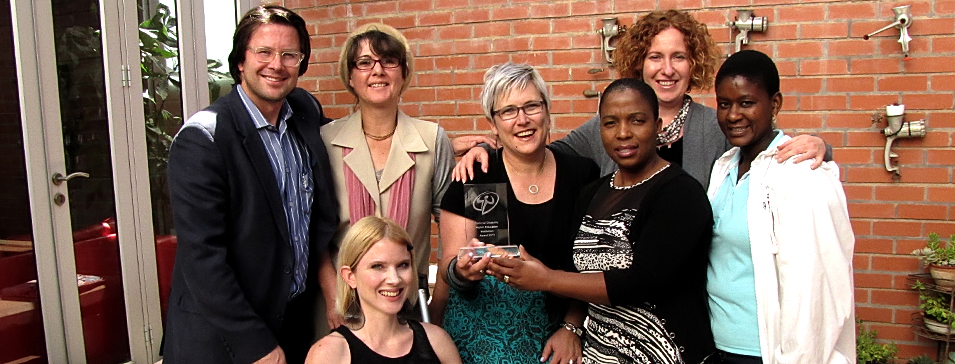Latest News Archive
Please select Category, Year, and then Month to display items
10 March 2022
|
Story Anthony Mthembu
|
Photo Unsplash
 The No Student Hungry team gearing up to start distributing food parcels to the selected students.
The No Student Hungry team gearing up to start distributing food parcels to the selected students.
The UFS is one of the many institutions of higher learning where food insecurity is an active issue. However, the
No Student Hungry Programme is one of the initiatives launched at the university to assist in fighting food insecurity at the institution.
The purpose of the programme
Since its inception in 2011, the initiative has assisted many students in acquiring a healthy meal. Additionally, the Food Environment Office also hands out food packages, so that students can continue to achieve academically. “We are trying to develop a healthy environment for students and make it easier for them to have a nice and healthy meal,” stated Annelize Visagie, who heads the Food Environment Office at the UFS. The Food Environment programme is spread out on all three campuses, each with its own facilitators. Furthermore, the programme mainly caters for students who are not funded by the National Student Financial Aid Scheme (NSFAS) but who are excelling academically. The abovementioned students apply for assistance online, and a list is then drawn up of students who receive assistance for the year.
Alternative solutions to keep the initiative running
On the Bloemfontein Campus, the No Student Hungry Programme will be catering for 200 students in the 2022 academic year, assisting them with a daily nutritious meal. Additional food parcels are also handed out to provide further assistance. “We give food parcels to the students on the list every Tuesday and Thursday at the Thakaneng Bridge,” Visagie highlighted. However, she argues that catering for the student population through this programme can be a challenge, as the demand for assistance is growing rapidly and the ability to assist is limited. The programme relies on partnerships and sponsors to assist the student body. In fact, the coordinators of the programme currently have a memorandum of understanding with Tiger Brands according to which they deliver around 100 food parcels for distribution.
In addition, the coordinators have put in place alternative measures to ensure that they can provide more food to students. “The
Kovsie Act Office, in partnership with the
Department of Sustainable Food Systems and Development, has started a food garden where healthy and nutritious produce are grown, in order to add value to the distribution,” she indicated. Although the programme can only assist to a point, students who are in desperate need of assistance are never turned away. In fact, the
Social Support Unit at Thakaneng Bridge usually assists students with food vouchers for a maximum of four days.
A commitment to teaching healthy eating habits
The programme is not only committed to curbing food insecurity, but also to ensuring that students have a healthy and balanced diet. As such, a booklet is being issued by the
Department of Nutrition and Dietetics in collaboration with the Department of Sustainable Food Systems and Development, which contains ways in which students can make a healthy meal using some of the ingredients offered in the food parcels.
“We want to teach students how to eat healthy in the cheapest way, because they don’t have a lot of money to buy expensive food products,” Visagie argued.
University recognised as leading Higher Education Institution for students with disabilities
2013-12-05
 |
The University of the Free State has been lauded for creating an inclusive environment for persons with disabilities, winning the 2013 National Disability Higher Education Institution Award. The award was presented at the National Disabilities Awards held in Port Elizabeth as part of the celebrations for International Day of People with Disabilities.
The Deputy Minister for Women, Children and People with Disabilities, Hendrietta Ipeleng Bogopane-Zulu, commended the university during the event for standing out among South African institutes of higher education. She told the audience the award gives recognition to institutions that demonstrate, through their strategy and policy, the provision of an inclusive environment for persons with disabilities. This is done through the use of technology and accessibility at their premises.
It's not the first time the university received praise from the deputy minister. In 2012 she visited the Bloemfontein Campus as part of a nation-wide roadshow to assess disability compliance and support services at all universities and FET colleges. Impressed with the work of the Unit for Students with Disabilities (USD), she recommended that staff from various higher education institutions visit the campus to gain insight into what they are doing.
Receiving the award on behalf of the university, Hetsie Veitch, Director of the USD, says the award recognises the commitment of the university’s senior leadership, who support the USD in creating a learning environment that is welcoming and accessible to all students.
Rudi Buys, Dean of Student Affairs, says the university is appreciative of what the USD does and says the award is a great achievement for a unit that only started functioning on its own three years ago. “The role of our support unit for Students with Disabilities has since 2010 grown to hold not only a prominent place in our institutional reflection on and implementation of approaches of universal access, but also to stand as leading department in building and bearing witness to the commitment of the UFS to values of universal access.”